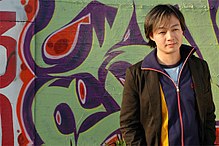Christopher Tin
| Christopher Chiyan Tin | |
|---|---|

Tin in 2007
|
|
| Born |
Christopher Chiyan Tin May 21, 1976 Redwood City, California, United States |
| Occupation | Composer |
| Website | christophertin |
| Christopher Tin | |||||||||||||||
| Chinese | 田志仁 | ||||||||||||||
|---|---|---|---|---|---|---|---|---|---|---|---|---|---|---|---|
|
|||||||||||||||
| Transcriptions | |
|---|---|
| Standard Mandarin | |
| Hanyu Pinyin | Tián Zhìrén |
| Wade–Giles | Tien Chih-jen |
| Yue: Cantonese | |
| Yale Romanization | Tin4 Ji3 Yan4 |
| Jyutping | Tin4 Zi3 Jan4 |
Christopher Chiyan Tin (born May 21, 1976) is an American composer whose work is primarily classical with a world music influence. He is a composer for films, video games, and commercials and has won two Grammy Awards for his classical crossover album, Calling All Dawns. Tin is best known for his composition Baba Yetu, featured in the 2005 computer game Civilization IV, the first piece of music composed for a video game to ever win a Grammy Award.
Christopher Tin was born and raised in Redwood City, California to immigrant parents from Hong Kong. He worked on his undergraduate education at Oxford and Stanford University. At Stanford, he was active in the taiko group, Stanford Taiko, and conducted the a cappella group, Stanford Talisman, several musicals, and choral concerts at the 1996 Summer Olympics in Atlanta, Georgia. He graduated in 1998, receiving a BA with Honors in Music Composition and English Literature. He continued to study at Stanford and received an MA in Humanities in 1999. After a period as an exchange student in Oxford, he was awarded a Fulbright Scholarship, the first to be awarded for film scoring, to study composition and conducting at the Royal College of Music in London. There he graduated with an MMus with Distinction and the highest grades in his class and was the winner of the Horovitz composition prize. While in London, he was commissioned by the United States Embassy to compose music for a string quartet. In 2003, he became a Sundance Institute Film Music Lab Fellow.
...
Wikipedia
